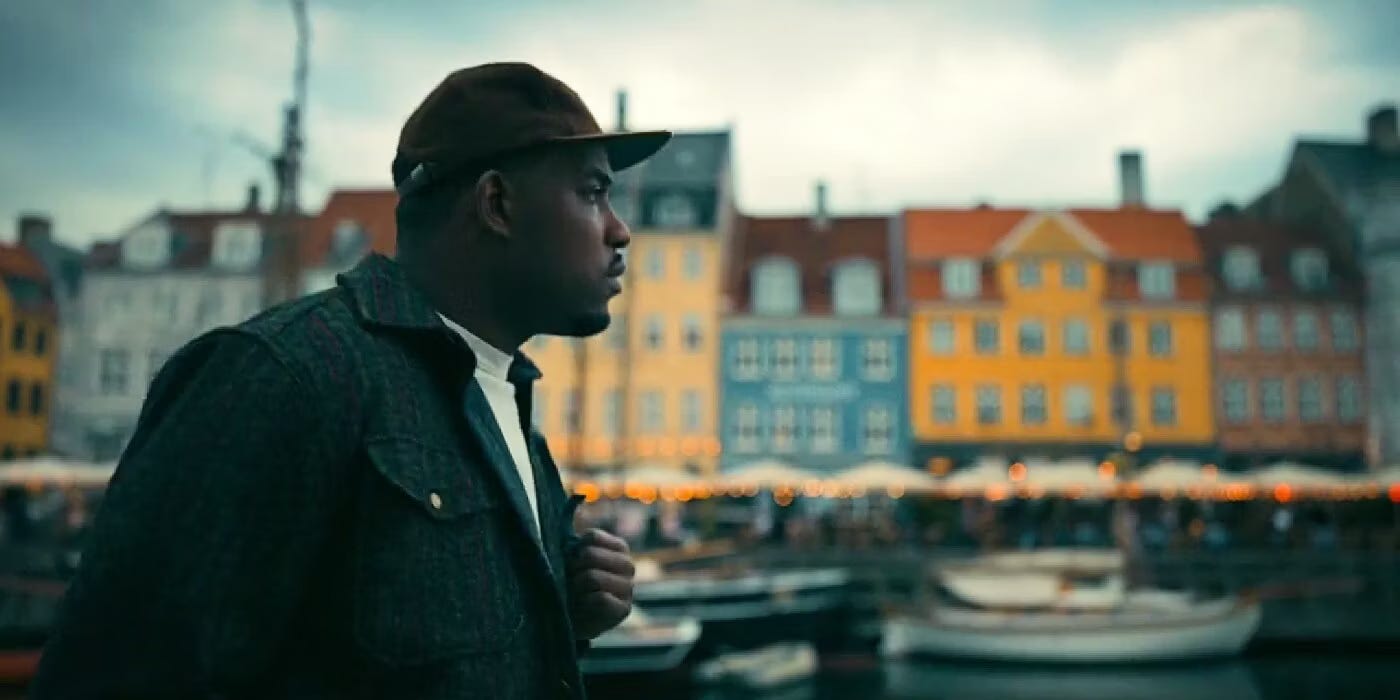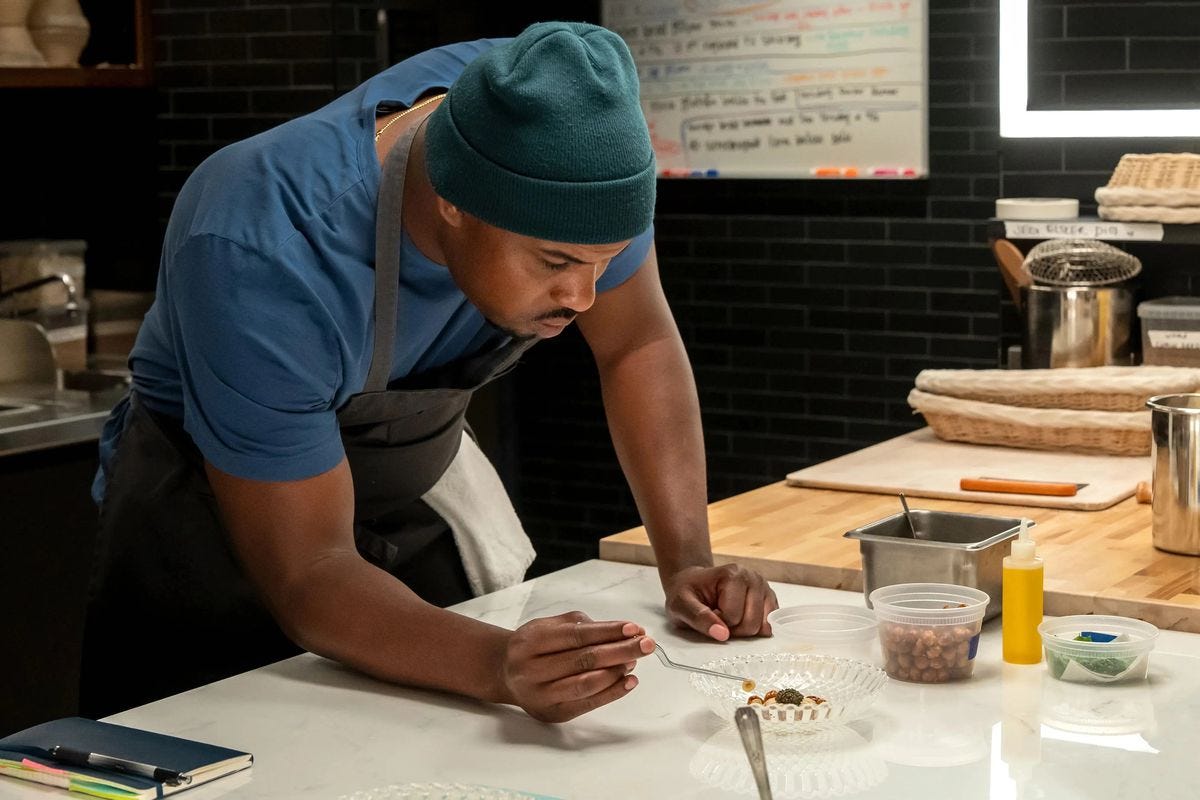A Study in Showing Up
What The Bear's Marcus Episode Taught Me about Openness
Enjoy an audio reading of this essay, or scroll to keep reading.
Everyone has been talking about FX’s The Bear. And rightfully so. It’s a phenomenal show. I don’t watch much scripted television these days. The world is hard enough to keep with. But I also want to be a part of the conversation. So I’ll usually skip the first season of a show—or at the very least, I’ll let a few episodes pass before I attempt to jump in. When I’m talking to a friend or coworker, I typically realize I’m missing something I might really enjoy. That’s how I found myself binging season one of The Bear, so I could make it to the second season as quickly as possible.
Early in the morning, while Elizabeth was asleep, I’d trek down to our partially unpacked living room and work through The Bear an episode or two at a time. Before watching the show, I knew I’d love Lionel Boyce’s character.
Boyce is close friends with Tyler, The Creator. Stemming from that relationship, I’d gotten glimpses of Boyce's personality in the Adult Swim sketch comedy show Loiter Squad, different Tyler interviews where Boyce was present, and Jasper & Errol’s First Time (previously on VICE TV). Where Boyce’s Odd Future friends seemed to be more comfortable in front of the camera, he tended to play the background, which isn’t too far off from his role as Marcus, a pastry chef on The Bear.
As Carmy, played by Jeremy Allen White, looks to turn around his late brother’s restaurant, Marcus shows a love for learning. While the other chefs get caught up in the chaos of the restaurant, Marcus diligently follows his passions, aiming to perfect his baked goods even as other tasks slip.
Marcus' character connected with me as someone who gets so lost in his art that he can lose sight of the people around him. I’ve been known to write next to Elizabeth on the couch and, without realizing it, not speak for hours. Creative expression can be beautiful—and, without the necessary boundaries, a vacuum. But sometimes, that fixation is self-imposed.
At the start of episode four in the show’s second season, we see why Marcus may feel a stronger pull to lose himself in his work. As Selome Hailu reported for Variety, Marcus’ mother is “rendered nonverbal due to ALS.” This leaves her bedridden. Later, we learn it’s been four years since her initial diagnosis. At that time, Marcus was informed her life expectancy was only one to two years.
We can assume Marcus spends most of his time outside of work at his mother’s bedside, just as he does at the start of the Ramy Youssef-directed episode. And that’s how we learn Marcus is being sent to Copenhagen with a challenge—to train under a world-class pastry chef and bring back three dessert ideas they can serve at the new restaurant. Episode four, "Honeydew," becomes almost singularly focused on Marcus’ journey.
Chef Luca, played by Will Poulter, is firm and direct with Marcus but never cruel. The quiet ambience of Luca’s kitchen is more like the silence of Marcus’ mother’s hospital room than the maddening chaos of the kitchen Marcus and his fellow chefs work in back home. Marcus is able to immerse himself in learning and practicing his craft. Over the course of the episode, you can see Marcus go from watching Luca and mirroring his every move to working alongside Luca shoulder to shoulder.
In the most illuminating conversation of the episode, Luca and Marcus get to know each other more. They share how they became chefs. They learn about each other’s families. Then, Marcus asks Luca how he became good at baking and making pastries. “Honestly, I made a lot of mistakes,” replies Luca. He continues to share how he grew his skills by learning and accepting he could only be the best he could be. Luca then states, “I think at a certain stage it becomes less about skill and it’s more about being open.”
When Marcus asks him what he means, Luca clarifies it’s about being open “to the world, to yourself, to other people.” He concludes by saying, “You can spend all the time in the world in here, but if you don’t spend enough time out there…” He stops before finishing his sentence. He knows Marcus gets it. Then, Luca throws in one more thing: “It helps to have good people around you, too.”
I’m a sucker for an earnest, on-screen moment. But this scene immediately hit me because of the moments around it. When Marcus first arrives in Copenhagen, you see more shots of the scenery than you see of food or even Marcus. Buildings, flowers, birds, and statues. They’re glimpses of what Marcus can encounter in the city. Then, after his conversation with Luca, Marcus engages these things. You see him outside being inspired. Walking around. Trying different foods. Taking pictures. He even stops by Noma, considered the world’s best restaurant before it closed at the start of the year. When Marcus returns to the kitchen, he tries creating the first dessert Luca taught him. Not only does he make it, but Marcus is so proud of his dish that he takes a picture of it.
I want to be the best writer I can be, which means I have to write—an act that is siloed and independent in and of itself. Writing requires me to put my head down. Inherently, I close myself off from the world. And there’s a time and place for that. But writing also requires me to have something to write about. I have to be open to new ideas and the people and moments around me that shape those ideas.
Hanif Abdurraqib talks about writers getting comfortable with the “glacial pleasures” of research. In school, I hated research—or at least the obligation of it. And maybe the way I was taught to research did suck. But over time, I’ve learned the study that shapes my writing tends to happen without me realizing. It’s the rabbit holes I go down, the conversations I enjoy, and the moments that feel like déjà vu that are just me catching a reference to something I witnessed earlier. All of this is research, and it only asks of me that I show up.
My friend Kayla works at a school and gets summers off. She’s also a writer. At the beginning of the summer, Kayla asked me if I’d be down to have weekly writing sessions with her. We both agreed it would be valuable to set aside time to write whatever we want and talk through what we’re working on and any challenges we might face while writing.
During the first meeting, we acknowledged we didn’t know what this would become. But we knew it was time well spent. We gathered around a desire to show up and see what happens. I don’t know how much of this was us saying what the other needed to hear, but it feels like openness. When Cole texts me saying he submitted a new pitch, that feels like openness too. And as I stand here writing this while Cheech curls up on top of his cat tree, I think about the outside world he sees and how I didn’t plan to mention this when I initially jotted my notes.
Marcus’ character is gentle. He’s endearing. He wants to be great, and he wants to learn how to be great. Marcus’ life isn’t separate from his work. Rather, he folds his life into his work. “The physicality is when it clicked for me: ‘This is care,” Boyce says about the scenes where Marcus sits with his mother. “I’m picking her hand up and massaging it, and this is how he approaches his craft, but he’s been doing this much longer. It’s like, ‘Oh, baking bread and pastries is like what I’m doing here.’”
As I live and become more aware of my living, essays get written before I’ve even put pen to paper. The threads are collected for tapestries that might eventually get woven, lending their material to new research for whoever might come after. In the shaping, we become.





This is one very beautiful essay, thank you for your words and your courage to be so honest 🌺
“study” and “research” are among the words I hope to bring warmth back to in my own writing. You’ve done it here, so beautifully. 🙏🏾